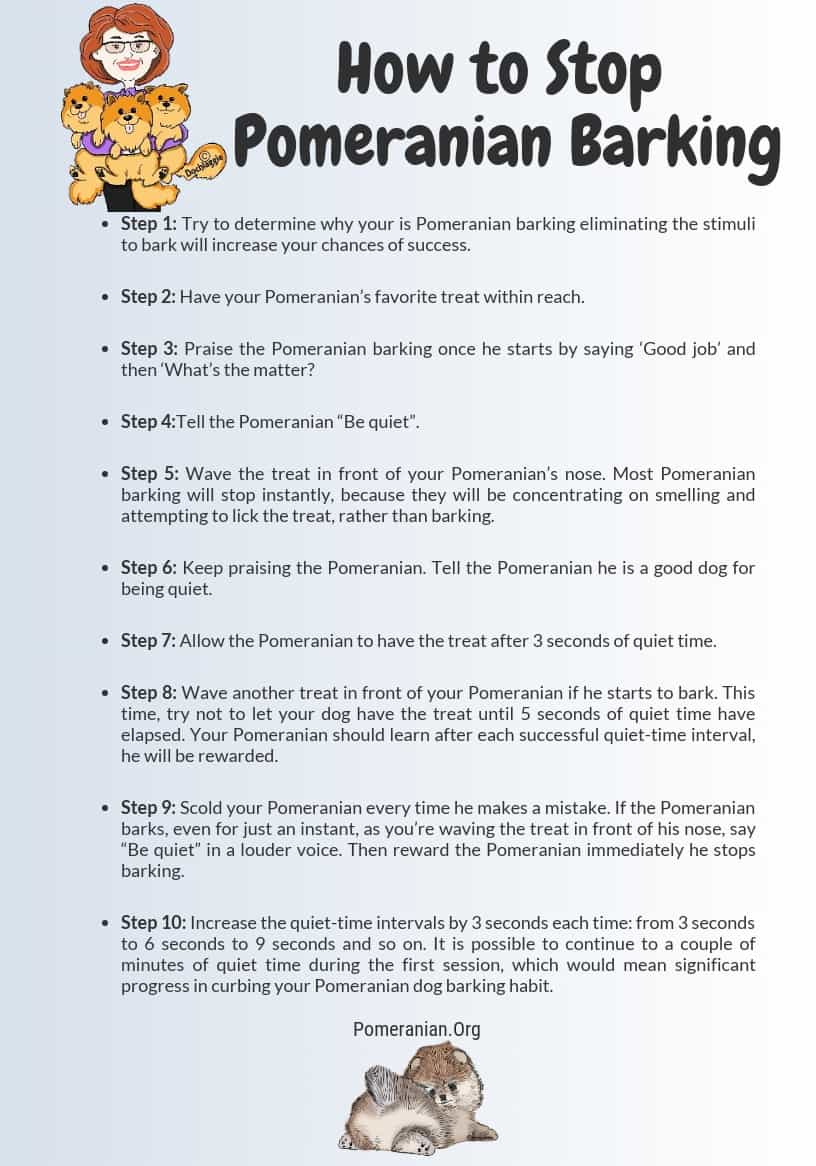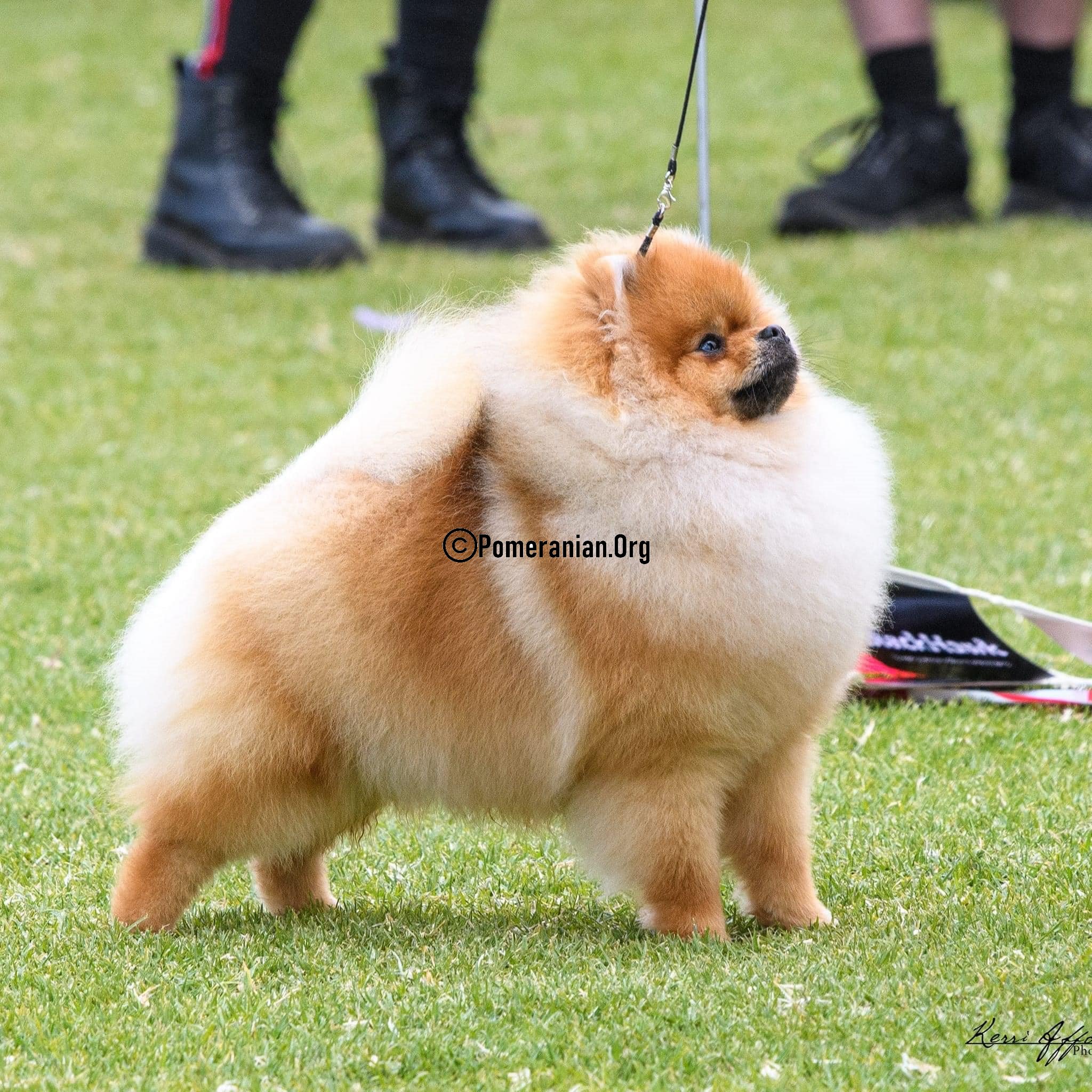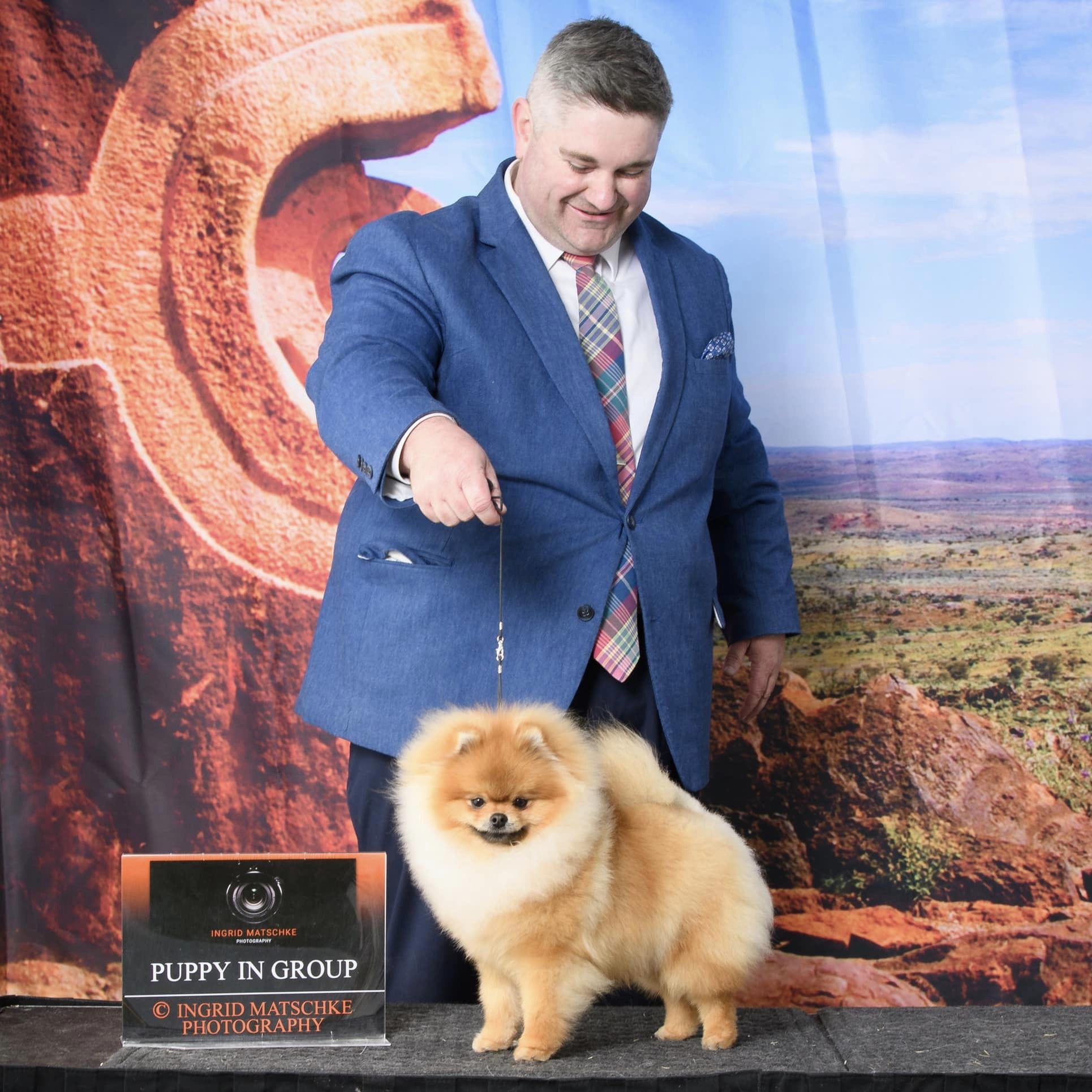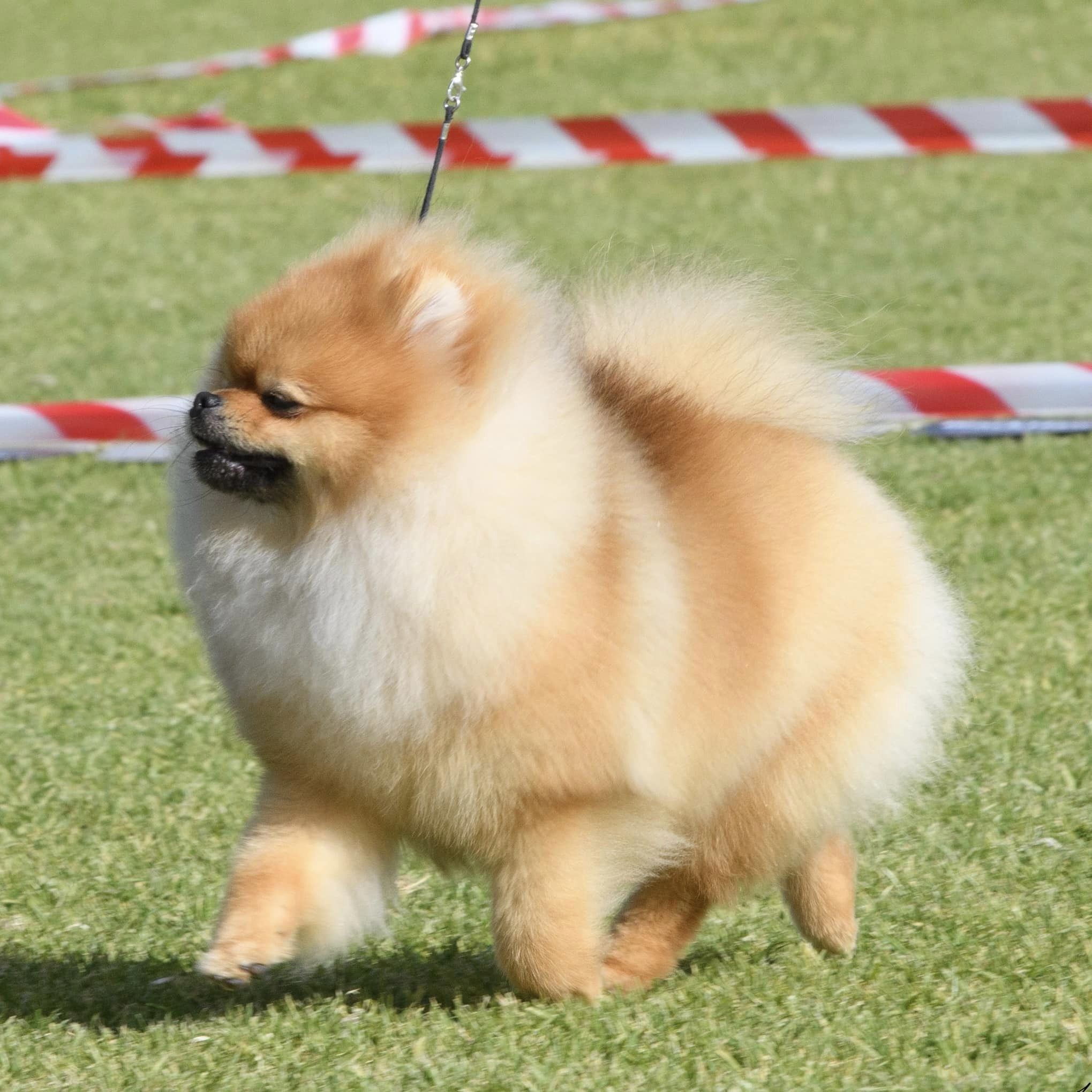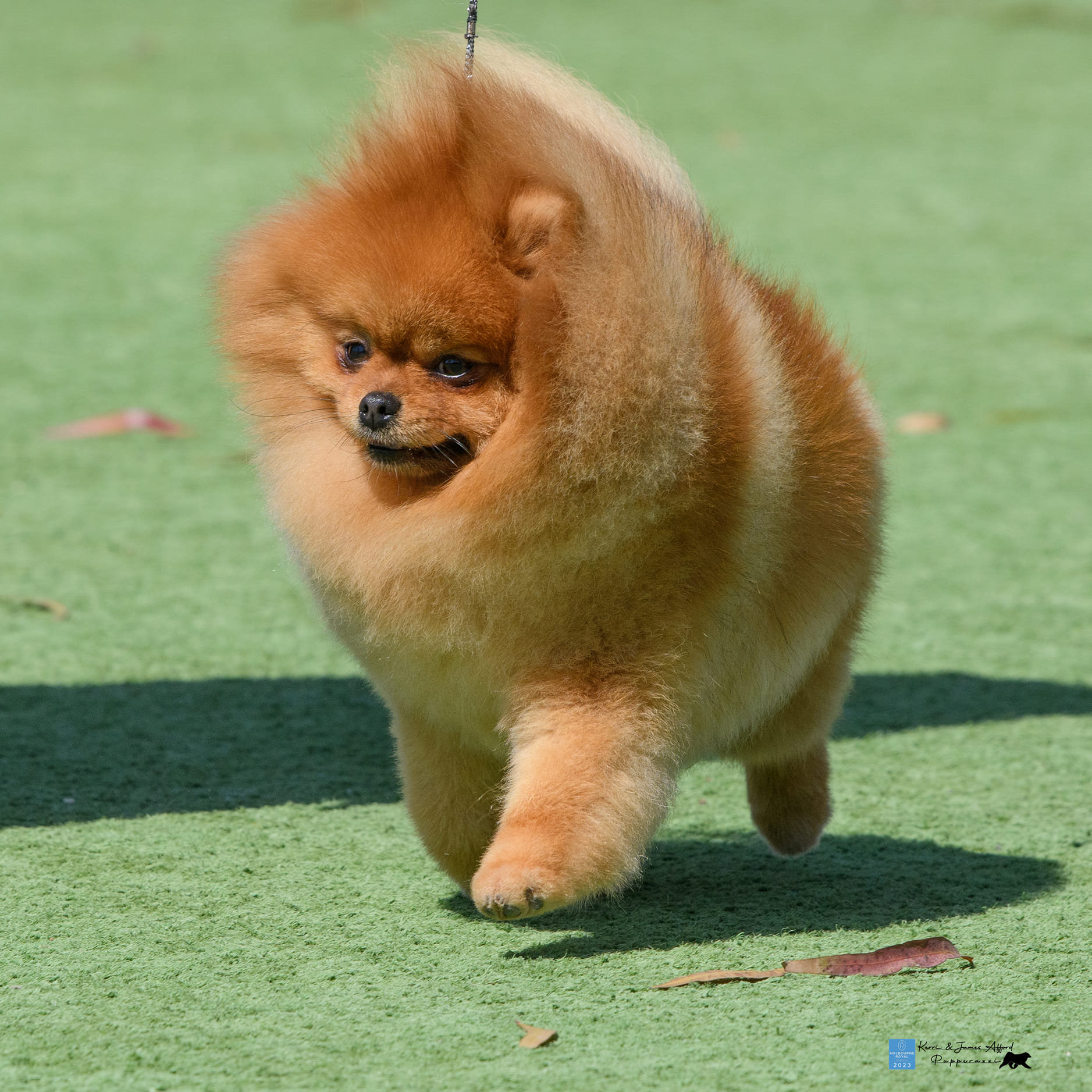Last Updated on 23/09/2023 by Dochlaggie. Post first published on October 2, 2021.
Do you have a Pomeranian barking problem? Is your Pomeranian barking incessantly? Do you want to know how to train your Pomeranian to stop barking? Well, now is the time for that knowledge.
You ask do Pomeranians Bark a lot, do all Pomeranians bark a lot and why do Pomeranians bark so much?
As a Pomeranian lover and owner and breeder of Champion Poms for many decades, I am suitably qualified to help you with problems like why does my Pomeranian bark so much?
Most importantly as a Pom dog owner, you want to know how to train a Pomeranian puppy not to bark. Learn how to stop a Pomeranian from barking.
If you have a Pomeranian, you likely know how much they bark. One of the most common complaints about this breed is their excessive barking. However, there are some things that owners can do to manage and reduce these behaviors if they want to live in peace with their dogs. Let us look at what those options may be so you can find an option that works best for your household.
In this ultimate Pomeranian barking training guide, you’ll discover:
- Why Pomeranian bark.
- Learn what the differant barking noises mean.
- How to deal with barking issues.
- How to stop Pomeranian dog’s barking.
Discover the secrets to stop your Pomeranian puppy from barking with this ultimate guide. Learn how different types of barking (and their meanings) can be used for a variety such as training and conditioning, 6 common situations that cause problem behaviors like excessive vocalization or separation anxiety when left unchecked by owners who don’t know what else do in these circumstances – plus much more!
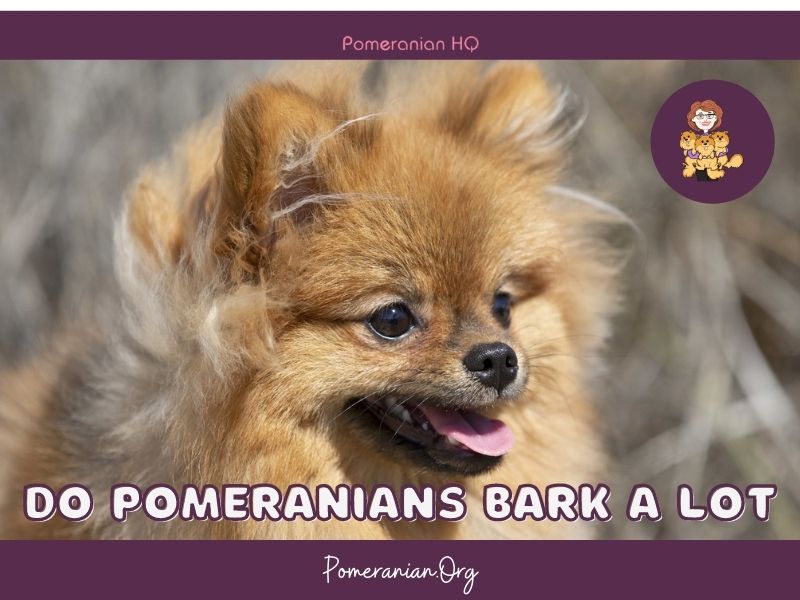
Why Do Pomeranians Bark?
Barking is a perfectly natural and normal behavior in dogs. Pomeranian dog barking or what is also known as Pomeranian yapping can become a problem if not curbed. A Pomeranian bark is a major communication method and some dogs tend to bark more than others.
In the same way that you try training your Pomeranian, he also has a language he wants the owner to understand. The language for most dogs is barking.
It may seem like noise, but often it’s your dog’s attempt to tell you something. Dogs rarely bark for no reason, so try to understand their end of the conversation and find a solution to the problem.
Dealing With Pomeranian Dog’s Barking Issues
The first step to combatting your Pomeranian’s excessive barking is to understand the root of the problem.
Is it anxiety? Boredom? Fearful or protective instincts? Once you know what type of barker you have, we recommend addressing these issues as soon as possible.
If your dog barks because they are anxious and bored, try adding more enrichment into their day, such as a new toy or playtime with another pup at home.
If there may be an underlying fear present like thunderstorms, make sure that you take extra precautions during those times where appropriate (i.e., don’t leave them outside).
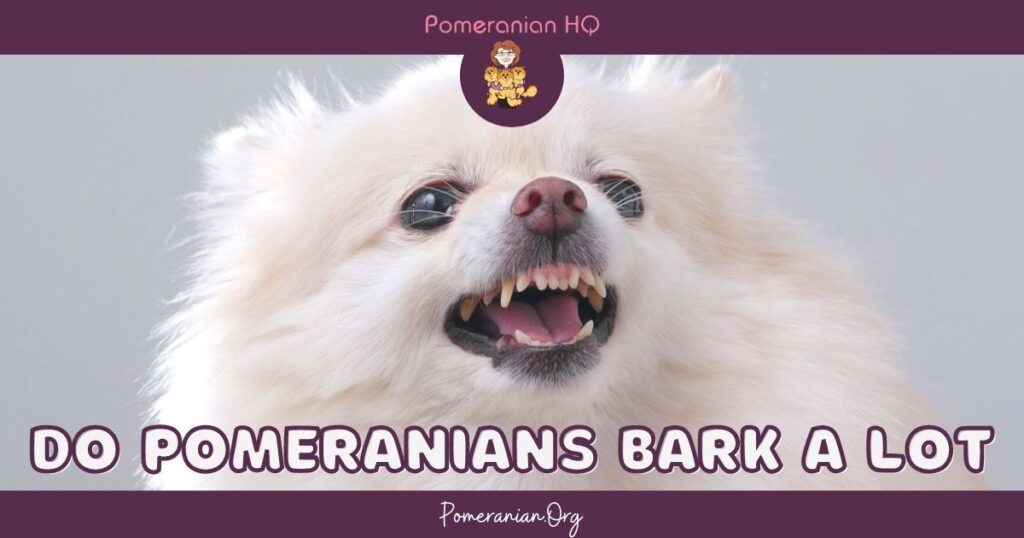
Learn to Understand the Different Pomeranian Barks
There are several different types of barks Pomeranians commonly use to let their owners know something is happening. Sharp, loud barks often mean they have sensed an intruder or commotion and are trying to warn you of possible danger. They’re also trying to notify the intruder that it’s their job to protect the area and they’re doing it properly.
A Pomeranian may also bark if he’s:
- Happy and excited.
- Sad and/or Bored.
- Seeking attention.
- Sick, in pain or distressed.
- Responding to other animals.
Shouting doesn’t help the situation and often makes it worse. If the owner can remove as much anxiety as possible, has tried to deal with the situation patiently and attentively, and still can’t achieve positive results, a veterinarian or professional trainer should be consulted.
All dogs bark, but excessive Pom barking for no apparent reason can be a signal that something is seriously wrong. It’s your job to pay attention and try to understand what your dog is trying to tell you.
It’s both unfair and unrealistic to expect your Pomeranian to become mute, but here are a few simple steps to teach him to only bark when appropriate.
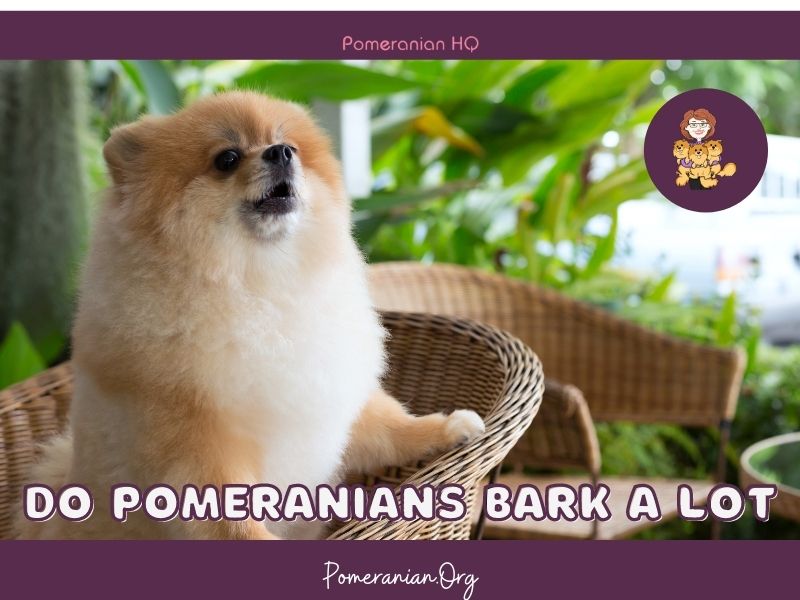
Separation Anxiety
Separation anxiety is often noted with a high-pitched bark or a whining sound. In many cases, if this anxiety isn’t properly handled, it can lead to destructive actions.
Being able to soothe and comfort a Pomeranian and let him know he hasn’t been abandoned is very important. A good owner will respond when he hears these types of sounds from a puppy.
Pomeranians are often owned by elderly people who have more free time to spend with their Pom. These owners are often retired and spend more time closer to home or on short car trips where the puppy can come along.
The more accustomed the Pomeranian is to have people close by, the more difficult they’ll find it to be alone.
Learn How to Stop Incessant Pomeranian Barking
- Check with the breeder of your Pomeranian to find out if your Pomeranian barking habit is normal.
- Does the breeder have any special tips or tricks that they may share to help stop Pomeranian barking ?
- Ask if there is a tendacy for excessive barking in your Pomeranian’s family? Do pomeranians bark a lot.
- As a general rule small dogs can be “yappy”, if not properly trained from a young age.
- A well trained Pomeranian is a joy to live with, the opposite can be said for an untrained, spoilt Pomeranian.
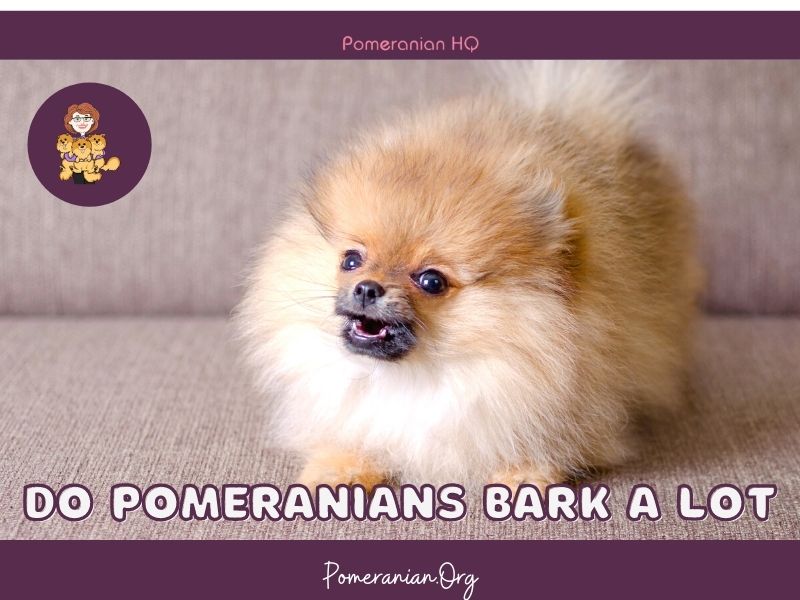
Preventing Poms From Barking in Certain Situations?
Pomeranians are one of the most vocal dog breeds, but they can learn to communicate by more than just barking.
Picking up on four everyday situations that your pup may be experiencing and their typical responses will help you better understand them.
For example, if it sounds like they are stressing out from something happening at home, then try these techniques:
When Someone Knocks on the Door or Rings the Doorbell
Your Pomeranian is a watchdog and highly sensitive to any movement. That’s because they descend from the Spitz Dog, which used its keen sense of hearing to warn their masters about danger.
Acknowledge his efforts by saying ‘good dog’ or thank-you’, give a treat as a reward. If you don’t want your pup alerting you all day long, try this: praise him when he doesn’t react with an excited greeting; give treats as rewards for sitting patiently while other visitors enter.
Fear Barking
How to teach your Pom that the noise isn’t threatening. Find a way to replicate it, and create positive associations in advance. For example, try knocking on an empty table before guests come over and giving treats for good behavior.
Barking at Neighbors
When you see your neighbor is outside, take a Pom out on their leash. Important: You want to catch the attention of your pup after they’ve spotted someone and haven’t barked yet.
Say “treat,” then give you Pom one! If your Pom’s reaction was faster than yours and he barked before you got a chance to offer treats, still reward your dog. When hearing or seeing this person say “treat” to your dog, so he associates this person with rewards.
When your Pomeranian Wants Something
The Pomeranian is a small dog that loves to greet you with its mischievous antics. They are also known for barking when they want attention and being good at winning it. They demand that you play with them and bark until they get what they want – in this case, your time or just some affection from their human counterpart.
Telling your pup “no” is rewarding their effort by giving them some acknowledgment. The solution is simple, and You must ignore your Pomeranian and make it clear that barking won’t get them anything! Understand – no eye contact, talking back, or touching at all costs; this will teach the little pup that nothing comes from misbehaving in such a manner.
Manners for dogs are important because they can affect how well people interact with them.
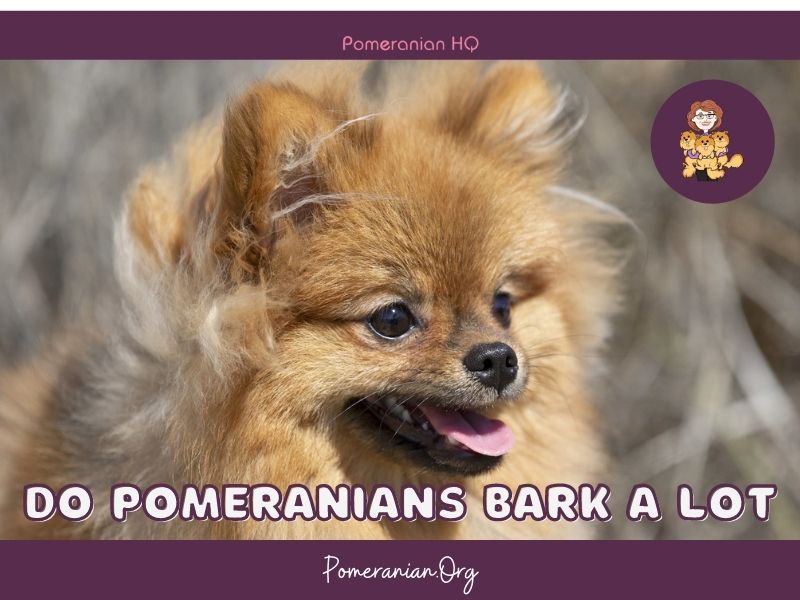
How to Train Pomeranian Not to Bark
It is both unfair and unrealistic to expect your Pomeranian to become mute, but here are a few simple steps to teach your Pomeranian to only bark when appropriate.
How to Stop Pomeranian Barking
- Step 1: Try to determine why your is Pomeranian barking eliminating the stimuli to bark will increase your chances of success.
- Step 2: Have your Pomeranian’s favorite treat within reach.
- Step 3: Praise the Pomeranian barking once he starts by saying ‘Good job’ and then ‘What’s the matter?
- Step 4:Tell the Pomeranian “Be quiet”.
- Step 5: Wave the treat in front of your Pomeranian’s nose. Most Pomeranian barking will stop instantly, because they will be concentrating on smelling and attempting to lick the treat, rather than barking.
- Step 6: Keep praising the Pomeranian. Tell the Pomeranian he is a good dog for being quiet.
- Step 7: Allow the Pomeranian to have the treat after 3 seconds of quiet time.
- Step 8: Wave another treat in front of your Pomeranian if he starts to bark. This time, try not to let your dog have the treat until 5 seconds of quiet time have elapsed. Your Pomeranian should learn after each successful quiet-time interval, he will be rewarded.
- Step 9: Scold your Pomeranian every time he makes a mistake. If the Pomeranian barks, even for just an instant, as you’re waving the treat in front of his nose, say “Be quiet” in a louder voice. Then reward the Pomeranian immediately he stops barking.
- Step 10: Increase the quiet-time intervals by 3 seconds each time: from 3 seconds to 6 seconds to 9 seconds and so on. It is possible to continue to a couple of minutes of quiet time during the first session, which would mean significant progress in curbing your Pomeranian dog barking habit.
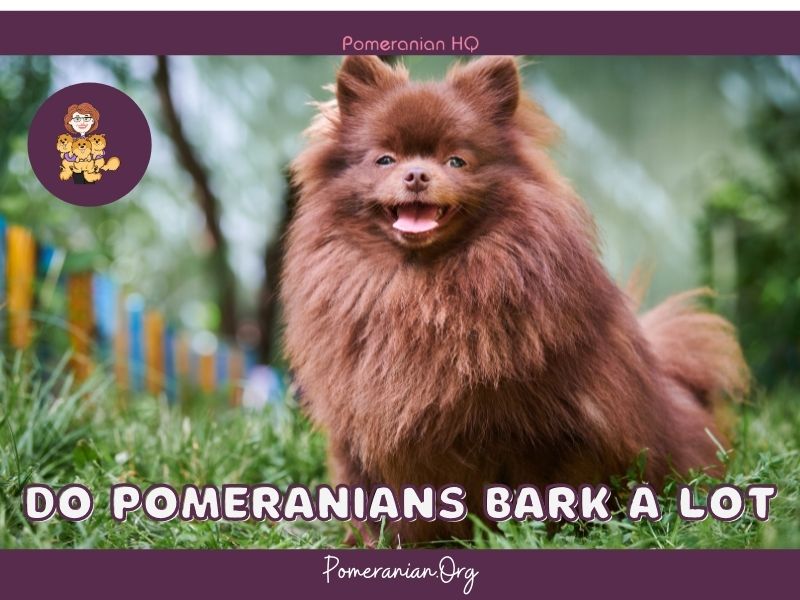
How To Train a Pomeranian Tips
How to train a Pomeranian not to bark. It may be time to get your Pomeranian to break the habit of excessive barking. Remain calm and patient, and eventually, he will bark only when it is appropriate.
I don’t recommend the use of a Pomeranian bark collar. As an extreme solution to Pomeranian barking speaks with your vet about surgical solutions to deal with your barking Pomeranian.
If you have trouble getting your Pomeranian to stop barking, there are people that may have ideas to solve the barking problem. The first step is to contact the breeder of your Pomeranian, if this fails, then consult a veterinarian or professional dog trainer trained in dog behavioral problems.
Pomeranian Barking Conclusion
Many people don’t realize that Pomeranians are one of the breeds with a tendency to bark often. So when you adopt or buy one, it’s essential to know their needs and how much time they need outside for exercise.
There are some things that owners need to know about Pomeranian barking. For example, it can indicate separation anxiety or boredom if the dog is left alone for too long.
It could also mean a medical issue like pain or heart disease in dogs with chronic illness. Owners should consult their veterinarian first before trying any home remedies. What other questions do you have? Let us know, and we’ll work together on finding answers.
Copyright Pomeranian.Org. All Rights Reserved.
References and Further Reading:
[1] Denise Leo “The Pomeranian Handbook”.
For complete and detailed Pomeranian Training information, Why your Pomeranian barks and how to control excessive barking, How to Interpret the Pomeranian Barking, How to Stop Your Pomeranian’s Excessive Barking, How to deal with Nipping or Biting, Destructive Chewing, Download the Pomeranian Training Book by Pomeranian Breed Authority Denise Leo. Once you purchase you will receive an email with the link to download. You have not received the download link? Please also check your junk mail folder for the link.
